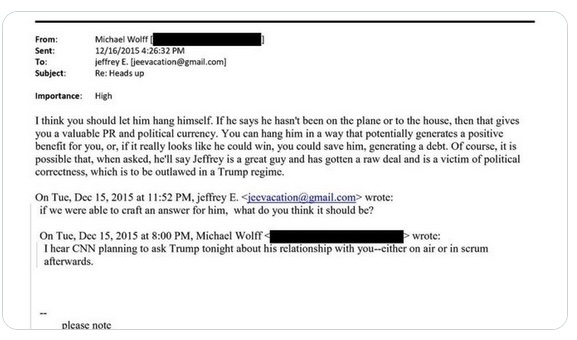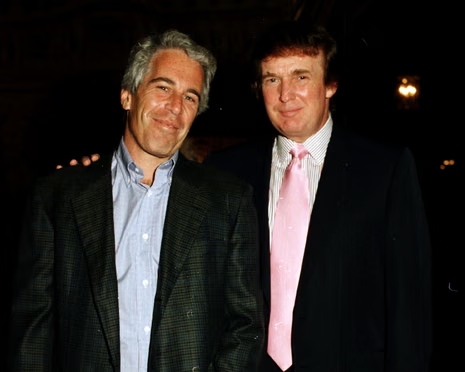A Hidden Thread Between Two Men
The recent release of congressional documents has renewed attention on the long-standing relationship between Jeffrey Epstein and Donald Trump. Emails disclosed by the House Oversight Committee revealed that Epstein mentioned Trump multiple times, referring to encounters with victims and discussing media strategy with author Michael Wolff. Lawmakers presented thousands of pages of correspondence, some showing Epstein’s efforts to influence coverage of his ties with Trump. Representative Robert Garcia of California, the ranking Democrat on the committee, stated, “These latest emails and correspondence raise glaring questions about what else the White House is hiding and the nature of the relationship between Epstein and the president.” The new disclosures revived public concern that sensitive information connected to Epstein may still shape the political landscape long after his death.
Congressional Discovery and Political Fallout
The documents emerged as the government prepared to end an extended shutdown, redirecting focus toward long-suppressed issues of transparency and accountability. Democrats demanded that the Justice Department disclose all remaining Epstein-related materials, citing public interest and survivors’ rights. Representative Ro Khanna of California said, “This is why I am working with Representative Massie to force a full release of the Epstein files. The public deserves transparency and the survivors deserve justice.” The committee’s release of Epstein’s correspondence with Ghislaine Maxwell and Michael Wolff indicated deeper political implications than previously assumed. As hearings continued, the disclosures intensified scrutiny over how much influence Epstein once wielded across political circles.
The 2015 Exchange and Strategic Silence
Among the revelations was a December 2015 exchange between Michael Wolff and Jeffrey Epstein that demonstrated deliberate calculation over Trump’s public image. Wolff warned Epstein that CNN planned to question Trump about their association during a Republican primary debate. In his response, Wolff advised, “I think you should let him hang himself. If he says he hasn’t been on the plane or to the house, then that gives you a valuable PR and political currency.” Wolff added, “You can hang him in a way that potentially generates a positive benefit for you, or, if it really looks like he could win, you could save him, generating a debt.” The email suggested Epstein’s knowledge of Trump’s activities could serve as leverage for either damage or protection depending on political outcomes.

The 2011 and 2019 Emails Reveal Knowledge
Earlier correspondence revealed Epstein’s belief that Trump was intentionally avoiding public acknowledgment of their past interactions. In a 2011 message to Ghislaine Maxwell, Epstein wrote, “I want you to realize that that dog that hasn’t barked is Trump. [Victim] spent hours at my house with him … he has never once been mentioned.” Maxwell replied, “I have been thinking about that,” confirming awareness of Trump’s silence on the matter. In a later 2019 email to Wolff, Epstein wrote, “Of course he knew about the girls as he asked Ghislaine to stop.” The combination of these statements portrayed Epstein as both aware of Trump’s proximity to his crimes and conscious of the potential value of that awareness.
White House Defense and Denial
The White House reacted forcefully to the publication of the emails, dismissing them as partisan attacks rather than credible evidence. Press Secretary Karoline Leavitt stated, “The Democrats selectively leaked emails to the liberal media to create a fake narrative to smear President Trump.” She further declared, “The fact remains that President Trump kicked Jeffrey Epstein out of his club decades ago for being a creep to his female employees, including Giuffre.” Republican committee staff echoed her remarks, claiming that Democrats “cherry-picked documents to generate click bait that is not grounded in the facts.” This coordinated defense framed the disclosures as a manipulation of context rather than a legitimate inquiry into possible complicity.
The Virginia Giuffre Question
Republican lawmakers identified the unnamed “victim” mentioned in Epstein’s 2011 email as Virginia Giuffre, who had long denied Trump’s involvement in the abuse. In her 2016 deposition, cited by The New York Times, she said, “I don’t think Donald Trump participated in anything. I never saw or witnessed Donald Trump participate in those acts.” Her statements, made before her death in April, aligned with claims by Trump’s representatives that he had distanced himself from Epstein years before his arrest. The absence of Giuffre’s living testimony has left open the question of how her encounters were interpreted by others in Epstein’s circle. Without her voice, the meaning of Epstein’s remarks remains suspended between assertion and speculation.
The Shadow of Leverage
Epstein’s exchanges with Wolff revealed how information, rather than belief or loyalty, often defined relationships within political and financial networks. His phrasing implied a deliberate retention of damaging knowledge that could be used as a weapon of influence. In Washington, information functions as currency, shaping decisions far beyond formal institutions. If Epstein possessed proof of Trump’s awareness, it could have represented a powerful bargaining tool that persisted even after his death. Such leverage, hidden within private correspondence, illustrates how secrets maintain value long after those who carried them are gone.
Shifting Attitudes and Political Sensitivity
Observers have pointed out that Trump’s recent statements about Israel appear inconsistent compared to his earlier unwavering tone. These adjustments coincide with the renewed exposure of the Epstein files, suggesting possible unease about further disclosures. The connection between political posture and private vulnerability raises questions about the hidden pressures behind foreign policy decisions. Leaders aware of their own exposure often act not from conviction but from an instinct for preservation. In that sense, the influence of Epstein’s legacy continues to shape not only reputations but also the actions of those still in power.
Demands for Full Disclosure
Calls for transparency have grown stronger as the Oversight Committee reviews additional material from Epstein’s estate. Representative Robert Garcia reaffirmed his position, saying, “The Department of Justice must fully release the Epstein files to the public immediately. The Oversight Committee will continue pushing for answers and will not stop until we get justice for the victims.” Lawmakers argue that withholding such documents perpetuates public distrust and fuels the perception of political protection. The request for full disclosure represents an attempt to confront decades of concealed power dynamics. Every hidden record preserves the influence of those who fear its release.
Secrets, Power, and the Weight of Silence
The persistence of secrecy surrounding the Epstein correspondence reveals how control of information defines political authority. Epstein’s death ended his personal accountability but did not end the leverage his network created. Those holding his documents still control narratives that reach into the upper levels of government. If the complete record remains sealed, it will continue to shield connections that shaped both personal and national decisions. The silence surrounding those emails now defines how history remembers the men who feared them most.

